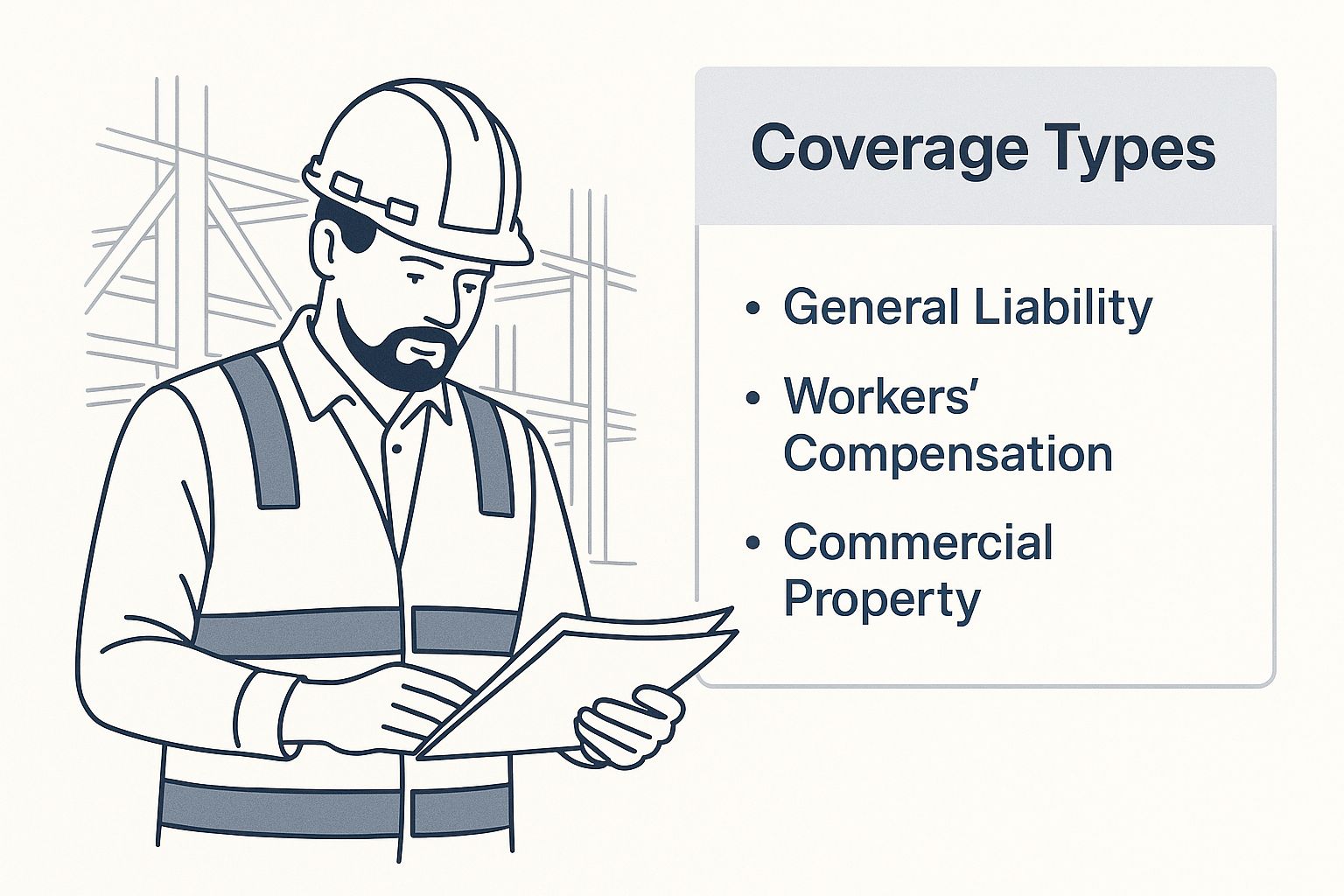When you're a contractor, your business is your life. Your skills are the framework, your tools are the fixtures, and your team brings it all together. But what’s holding it all up? The foundation.
Business insurance is that solid, concrete foundation. It’s a set of policies built to protect you from the financial fallout of accidents, lawsuits, property damage, and all the other curveballs the job can throw at you.
Without it, one slip, one mistake, or one unlucky day could threaten everything you’ve worked so hard to build.
Why Contractor Insurance Is Your Most Important Tool
Let's be real—many contractors see insurance as just another bill. It’s an expense that doesn't feel like it's making you money. But that’s a dangerously shortsighted view.
A better way to think about it is as your most critical tool, the one that protects every other asset you own. It’s an investment in your financial security and your ability to keep working, no matter what happens.
Without that foundation, a single crack—like an unexpected lawsuit or a major equipment theft—can compromise the entire structure.
The Daily Risks You Face
Every single day on the job is a new set of risks. These aren't just hypotheticals; they are real-world scenarios that happen to contractors all the time.
Imagine a ladder slipping and smashing a client’s expensive custom window. Or a team member accidentally cutting a utility line, causing massive service disruptions and an even bigger repair bill.
These incidents can trigger serious financial consequences:
- Accidental Property Damage: A simple paint spill on an heirloom rug or a piece of drywall falling on a client's car can lead to claims costing thousands.
- Third-Party Injuries: A visitor trips over your tools on a job site. Suddenly, you're facing a lawsuit for medical bills and lost wages.
- Employee Injuries: If a crew member gets hurt, you’re on the hook for their medical care and lost income. That's what workers' compensation is for.
- Faulty Work Claims: Even if your work is perfect, a client could claim your services were negligent, leaving you with a mountain of legal defense fees.
Your insurance policy is your first line of defense against financial ruin. It turns a potentially business-ending catastrophe into a manageable problem.
Ultimately, the right insurance is about more than just checking a box for a client or meeting a legal requirement. It's about building a resilient, professional business that can handle the inevitable bumps in the road.
It gives you the confidence to take on bigger jobs, hire more help, and grow your company, knowing you’re protected.
Understanding Your Core Insurance Policies
Trying to figure out insurance can feel like reading a blueprint in a foreign language. It's complicated. So, let's cut through the jargon and break down the essential policies every contractor needs in their toolkit.
Think of your business insurance for contractors as a layered defense system. Each policy protects you from a different kind of risk you face every single day. One handles a client tripping over your tools, while another covers an employee who gets hurt on the job. Getting these core coverages right is the first step to building a business that can withstand anything.
General Liability: The Foundation of Your Protection
If you only get one policy, this is it. General Liability insurance is the bedrock of your coverage, your first line of defense against claims that you caused injury or property damage to someone else. That "someone else" is a third party—a client, a vendor, a delivery person, or even just a neighbor walking by your job site.
Picture this: you’re moving equipment into a client’s home and accidentally shatter an antique mirror. Or maybe a visitor trips over a power cord and breaks their wrist. Without general liability, you’re on the hook for those costs yourself. We’re talking thousands of dollars out of your own pocket.
This is what it covers:
- Third-party property damage: Protects you if your work damages someone else's property.
- Third-party bodily injury: Covers medical bills if someone other than an employee is injured because of your work.
- Legal defense costs: Pays for your lawyers, court fees, and settlements if a claim turns into a lawsuit.

This image shows how different policies work together to create a complete safety net. While each one is distinct, they overlap to protect you from all sides.
Professional Liability: Guarding Your Expertise
While general liability is all about physical accidents—slips, trips, and breaks—Professional Liability insurance is about protecting your advice and workmanship. It’s also known as Errors & Omissions (E&O) insurance, and it defends you when a client claims your mistake cost them money.
Let’s say you design a new patio, but a measurement error leads to drainage issues that flood the client’s basement. They could sue you for the financial loss caused by your mistake. Professional liability would step in to cover your legal defense and any settlement, even if the claim is completely baseless.
This policy is your shield against claims that your work just wasn't up to professional standards. It’s absolutely critical if you offer any design, consulting, or project management services where one bad call could have major financial ripple effects.
To help you keep track, here’s a quick rundown of the most common policies.
Core Contractor Insurance Policies at a Glance
| Insurance Policy | Primary Coverage | Ideal For Contractors Who… |
|---|---|---|
| General Liability | Bodily injury & property damage to third parties (clients, public). | All contractors, as it's the foundational coverage. |
| Professional Liability | Financial losses to clients due to errors, negligence, or bad advice. | Provide design, consulting, or project management services. |
| Workers' Compensation | Employee on-the-job injuries, covering medical bills & lost wages. | Have one or more employees (part-time or full-time). |
| Commercial Auto | Accidents involving vehicles used for business purposes. | Use a truck, van, or car for work-related travel or transport. |
This table is just a starting point, but it highlights how each policy fills a specific gap in your business's protection.
Workers’ Compensation: Protecting Your Team
If you have employees—even a single part-timer—Workers’ Compensation isn't just a good idea. In most states, it's the law. This policy is the safety net for both your team and your business.
It covers medical bills and a portion of lost wages for any employee who gets sick or injured as a direct result of their job. If a roofer on your crew falls from a ladder, workers' comp handles their hospital bills and recovery costs, so they can focus on getting better.
This coverage also protects you. In exchange for these benefits, it generally prevents the injured employee from suing your business over the incident. As on-the-job injuries are a huge risk in this industry, this is a non-negotiable part of your business insurance for contractors. You can learn more by checking out the most common contractor insurance requirements to stay compliant.
Commercial Auto Insurance: For Your Work Vehicles
Heads up: your personal car insurance almost certainly won't cover an accident that happens while you're on the clock. That's a gap that Commercial Auto insurance is designed to fill. Whether you have one work truck or a whole fleet of vans, this policy is essential.
It provides liability and physical damage protection for any vehicle used for business. If you rear-end someone while driving to pick up materials, this policy covers the damage to their car and any injuries. It’s that simple.
More and more contractors are realizing just how vital this protection is. The global Property & Casualty (P&C) insurance market, which includes these core coverages, grew by 7.7% in just one year. Here in North America, premium income shot up 8.2% as business owners like you decide to build a stronger financial foundation.
When You Need Specialized Contractor Coverage
Your bread-and-butter insurance policies—like general liability and workers' comp—are the foundation of your financial protection. They handle the everyday risks that come with the job.
But what about the big, complex projects? The ones that push your skills and your business to the next level? Just like a custom build needs more than a standard toolbox, these larger jobs require specialized coverage that goes far beyond the basics.
Standard policies have their limits. They often fall short when it comes to high-value equipment, materials in transit, or the unique risks of a project that's still just a frame. Relying only on your basic insurance for a complex job is a huge gamble. These specialized policies are designed to fill those critical gaps.
Protecting Your Tools with Inland Marine Insurance
Don’t let the name fool you. Inland Marine Insurance has absolutely nothing to do with boats. Think of it as your "tools on the move" coverage.
Here’s why it’s so important: your general liability policy usually only covers your equipment when it’s sitting at your primary business location, like your shop. The second you load your valuable gear onto your truck to head to a job site, it’s often no longer protected.
Inland Marine bridges that gap. It safeguards your essential tools and machinery against theft, damage, or loss while they are:
- In transit to and from a job.
- Stored temporarily at a work site.
- Locked in your vehicle overnight.
Picture this: your work truck gets stolen from a job site, along with $15,000 worth of specialized equipment. A standard commercial auto policy might cover the truck itself, but it won’t touch the contents. Inland marine is the policy that steps in to replace those stolen tools, making sure one bad night doesn't shut down your entire operation.
Builder’s Risk Insurance for Projects in Progress
You’ve just broken ground on a new build. Who protects the structure and materials before the job is even done? That's where Builder’s Risk Insurance comes in.
Also known as "course of construction" coverage, this policy protects your financial stake in a structure while it’s being built. It covers the building and the materials on-site from disasters like fire, vandalism, theft, and brutal weather.
If a freak storm collapses the framing of a house you’re building, builder’s risk would cover the cost to buy new materials and rebuild the damaged section. It protects everyone involved—the project owner, the general contractor, and the subs—ensuring a catastrophe doesn't bring the whole project crashing down.
Builder's Risk is temporary. It kicks in when the project starts and ends once the building is complete. After that, a standard commercial property policy takes over.
Subcontractor Default Insurance: A Business Saver
If you're a general contractor, one of your biggest headaches isn't always your own work—it's whether you can count on your subs. What happens if the plumber you hired goes out of business right in the middle of a project? Everything grinds to a halt, deadlines get blown, and you’re left scrambling to find a replacement, usually at a much higher price.
This is where Subcontractor Default Insurance (SDI) can be a true business-saver.
Imagine you're the GC on a big commercial build and your HVAC sub suddenly declares bankruptcy. With SDI, you’re covered for the financial hit. That includes the cost of hiring a new, more expensive sub to get the job done on a tight deadline.
The need for this kind of specialized protection is only growing. The SDI market in North America now has carriers offering coverage limits of $50 million or more per loss. Without it, a single subcontractor's failure could create a financial disaster for your company. Understanding what happens if you don't have insurance for these specific risks shows just how essential these policies really are.
How Your Insurance Costs Are Calculated

Ever wonder why your insurance quote comes in at a specific number? It’s not just a figure pulled out of a hat. Think of it like putting together a bid for a construction project—the final price depends on the materials, the labor, and how complex the job is.
Insurance works the same way. Insurers are trying to figure out the odds of you needing to file a claim. The more risk they see in your business, the higher your premium will be.
Once you understand what they’re looking at, you can start to take control and find ways to lower your costs over time.
The Core Factors That Shape Your Premium
An underwriter’s job is to build a clear picture of your unique business risks. They piece this together by looking at a few key things.
- Your Specific Trade: This is the big one. A roofer working three stories up naturally faces more risk than an interior painter. The premium will always reflect that reality.
- Annual Revenue and Payroll: Bigger numbers mean bigger exposure. More revenue often translates to larger projects, and a larger payroll means more people are involved—both of which increase the potential for costly claims.
- Number of Employees: Every person on your team adds another variable to the risk equation. A bigger crew increases the chances of a workers’ comp claim.
- Your Claims History: This is your business’s driving record. A clean slate with few or no claims shows you run a tight, safe ship. That almost always leads to better rates.
Think of it this way: a contractor with a history of safety violations and frequent claims is like a driver with a handful of speeding tickets. They’ve proven they’re a higher risk, so they’re going to pay more for coverage. It’s that simple.
Location and Legal Climate Matter More Than You Think
Where you swing a hammer has a surprisingly big impact on your business insurance for contractors. State laws, local regulations, and even the general legal mood can drive costs up or down. For instance, if you operate in a state known for huge legal settlements, your liability premiums will likely be higher.
This is especially true for your liability coverage. A major driver of cost increases is the rise of massive jury awards in casualty claims across the country. According to experts at Marsh.com, while some global insurance rates have dipped, casualty insurance rates in the U.S. have jumped, thanks in part to what they call 'nuclear' jury awards. That trend hits contractors right where it hurts.
How Your Business Practices Influence Your Rate
While you can’t just pick up and move your business or change your trade, you have more control than you think. The day-to-day choices you make show an underwriter whether you’re a good risk or a potential headache.
Before calculating your premium, underwriters dig into several key areas that reflect how you run your business.
Key Factors Influencing Your Insurance Premium
| Cost Factor | Why It Matters to Insurers | How to Positively Influence It |
|---|---|---|
| Your Trade & Services | High-risk jobs like roofing or electrical work naturally carry higher premiums than lower-risk trades like painting. | Specialize in lower-risk areas if possible and always adhere to industry best practices. |
| Claims History | A history of frequent or large claims signals a higher likelihood of future claims. It’s your business’s track record. | Implement a robust safety program to minimize incidents. A clean record is your best discount. |
| Annual Revenue & Payroll | Higher revenue and payroll mean larger-scale operations and more exposure to potential losses. | Keep meticulous financial records. Accurate reporting prevents over- or under-insuring. |
| Employee Count | More employees directly increase the risk of workers' compensation claims. | Maintain thorough training protocols and a culture of safety to reduce workplace accidents. |
| Location | Premiums vary by state and even zip code due to local laws, weather risks, and litigation trends. | While you can't move, be aware of local risks and implement specific safety measures for them. |
| Safety Protocols | A formal, documented safety program shows you're proactive about preventing losses, making you a better risk. | Create a written safety manual, hold regular safety meetings, and document everything. |
Having a formal safety program, for example, makes a huge difference. It’s proof that you’re serious about preventing accidents. Using detailed contracts with a crystal-clear scope of work can also head off disputes that might turn into professional liability claims.
At the end of the day, showing a commitment to safety and professionalism makes your business a risk that insurers want to take on. Curious if you're paying a fair price? Our guide on how much you might be overpaying on insurance can shed some light.
Ultimately, managing your risk is the single most effective way to manage what you pay for insurance.
Getting the Right Insurance Quote for Your Business
Finding the right insurance for your contracting business shouldn’t be a confusing maze. With the right approach, you can get a quote that actually protects you without all the back-and-forth.
The secret? Be prepared. When you walk in with your information organized, you’re not just another customer—you’re a serious business owner who knows what you need.
Prepare Your Business Snapshot
Before you pick up the phone, get your key business details together. This one step saves a ton of time and makes sure the quote you get is based on reality, not a wild guess.
Think of it as creating a quick, clear profile of your company. It gives the insurance agent a full picture of what you do, which is exactly what they need to find you the right coverage at the right price.
Here's a simple checklist of what to have ready:
- Business Basics: Your legal business name, address, and license number.
- What You Do: A clear description of your services. "Residential deck and patio construction" is way better than just "construction."
- The Numbers: Your estimated annual gross receipts and total payroll.
- Your Biggest Wins: A quick summary of your largest projects from the last few years, including their value.
- Your Team: How many full-time and part-time employees you have, plus any 1099 subcontractors you bring on.
With this in hand, you’re ready to have a real conversation.
Choosing Your Insurance Partner
When it comes to getting a quote, you have two main options: a captive agent or an independent broker. Knowing the difference is a game-changer for your business.
A captive agent works for one single insurance company. They’ll know that company’s products inside and out, but they can only sell you policies from that one carrier. This can be fine if you’re already loyal to a specific brand.
An independent broker, on the other hand, partners with many different insurance companies. They do the shopping for you, comparing policies and prices to find the best fit for your specific risks. For most contractors, that flexibility is a huge plus.
No matter who you choose, the goal is the same: find someone who actually understands the contracting world and can turn your business risks into solid protection.
Asking the Right Questions
Once a quote lands in your inbox, your work isn’t over. Now it’s time to look closer and make sure you know exactly what you’re paying for. Don't be shy—asking direct questions now prevents major headaches later.
Here are the critical questions to ask before you sign anything:
- What are the coverage limits for each policy? (For example, $1 million per incident, $2 million total for general liability).
- What are my deductibles? How much do I have to pay out-of-pocket if I file a claim?
- Are there any major exclusions? What kind of situations are not covered?
- If I need to file a claim, what’s the process like?
- How fast can I get a certificate of insurance (COI) when a new client asks for one?
- Do you offer any discounts for things like having a safety program or bundling my policies together?
By getting clear answers, you make sure there are no gaps in your coverage and that the policy you choose truly lines up with the risks you face every single day.
Managing Risk Beyond Your Insurance Policy
Your insurance policy is a fantastic financial safety net, but let’s be honest: the most profitable job is always a safe one. The best claim is the one you never have to file.
True risk management for your contracting business goes way beyond just paying your premium. It’s about building a culture of safety that stops losses from ever happening in the first place.
This proactive mindset protects your team, your clients, and your hard-earned reputation. It's the difference between reacting to disasters and actively preventing them. When you shrink your daily operational risks, you build a more resilient and professional company.
Building a Framework of Safety
The first step is getting everything out of your head and onto paper. Moving from unwritten rules to a formal, documented process is a game-changer. A written safety program is your business’s playbook for preventing accidents.
It proves to clients, employees, and insurers that you are absolutely serious about risk.
Keeping meticulous records is just as critical. You need to document everything for every single job:
- Daily Safety Briefings: Jot down what was discussed and who was there.
- Incident Reports: Log every near-miss and minor accident. This helps you spot dangerous patterns before they become catastrophes.
- Project Documentation: Use photos and notes to track progress and site conditions.
Think of your documentation as your business’s best defense. In a dispute, clear, consistent records can be the evidence that proves you acted responsibly, potentially saving you from a devastating liability claim.
Your Contracts Are Your First Line of Defense
Finally, your contracts are one of your most powerful risk management tools. Don't overlook them.
Use detailed agreements with clients and subcontractors to clearly define the scope of work, responsibilities, and expectations. Ambiguity in a contract is practically an invitation for disputes.
When you actively manage risk through safety programs, documentation, and strong contracts, you do more than just avoid claims—you position your business for better insurance rates in the long run. Insurers reward contractors who are proactive because they are a safer bet.
This proactive stance is just as important as your coverage, especially when considering how to handle any potential health insurance gap in coverage for yourself or your team. It’s all part of building a business that’s designed to last.
Frequently Asked Questions About Contractor Insurance

Jumping into the world of business insurance for contractors always brings up a few key questions. It's totally normal. To make things easier, we've gathered clear, straight-to-the-point answers for the most common things we hear from pros just like you.
Think of this as your quick-reference guide—designed to help you make smarter moves and feel more confident about protecting the business you've worked so hard to build.
Is Business Insurance for Contractors Legally Required?
This is the big one, and the honest answer is: it depends on where you are and what you do. There isn't a single nationwide law that forces every contractor to carry general liability insurance.
However, state and local rules can be very strict. Most states, for instance, legally require you to have workers' compensation insurance the second you hire your first employee. And if your company uses vehicles, commercial auto coverage is almost always a must-have.
But the biggest push often comes from your clients. Major general contractors, big commercial clients, and government agencies simply won't sign a contract without seeing your proof of insurance. It’s a deal-breaker.
So while a specific policy might not be a legal requirement everywhere, trying to run a serious contracting business without it is nearly impossible.
How Much General Liability Coverage Does a Small Contractor Need?
While there’s no magic number, the industry definitely has a standard starting point. For most small and mid-sized contractors, a general liability policy with $1 million per occurrence and a $2 million aggregate limit is the baseline.
Here’s what that actually means:
- $1 Million Per Occurrence: This is the absolute most your insurer will pay for a single claim or accident.
- $2 Million Aggregate: This is the total cap on what your insurer will pay out for all claims combined during your policy term (which is usually one year).
Think of that "$1M/$2M" policy as your foundation. The right amount for you really boils down to the kind of risks you face. A roofer working on large commercial buildings needs much higher limits than a painter who only does interior residential jobs. Always, always check your contracts—clients will often tell you the minimum coverage they expect you to carry.
Choosing your coverage limit isn't about just checking a box. It's about making sure one bad day on the job doesn't sink your entire business. A serious lawsuit can blow past a small limit, leaving you on the hook for the rest.
What Does It Mean to Add a Client as an Additional Insured?
Don't sweat it when a client asks for this. It’s a completely normal request on commercial or high-value projects.
When you add a client as an additional insured on your policy, you're essentially extending your liability shield to cover them, but only for claims related to your specific work.
Here’s a real-world example: say you’re an electrician, and a faulty wire you installed causes a fire that damages the client's building. If they get sued by a tenant for the damage, your insurance policy would step in to defend them, since your work was the root cause.
It gives your client peace of mind knowing they’re protected from the risks you bring onto their property. It’s a standard, professional courtesy in the contracting world.
Ready to get the right protection for your business without all the confusion? The team at My Policy Quote is here to help you find coverage that actually fits what you do as a contractor. Get a no-obligation quote and build a stronger foundation for your business today by visiting https://mypolicyquote.com.


